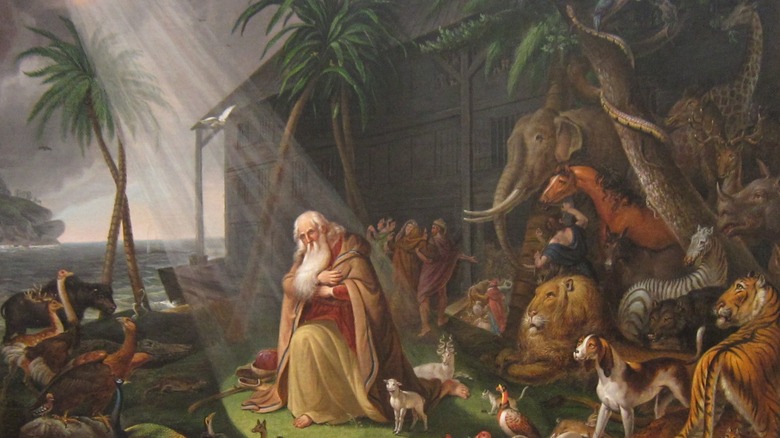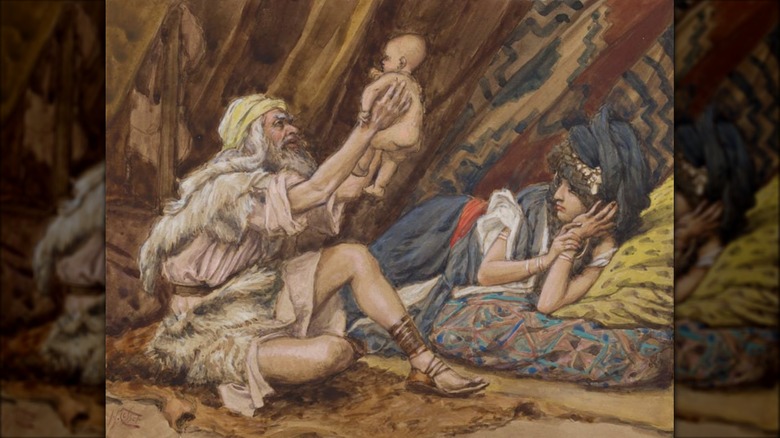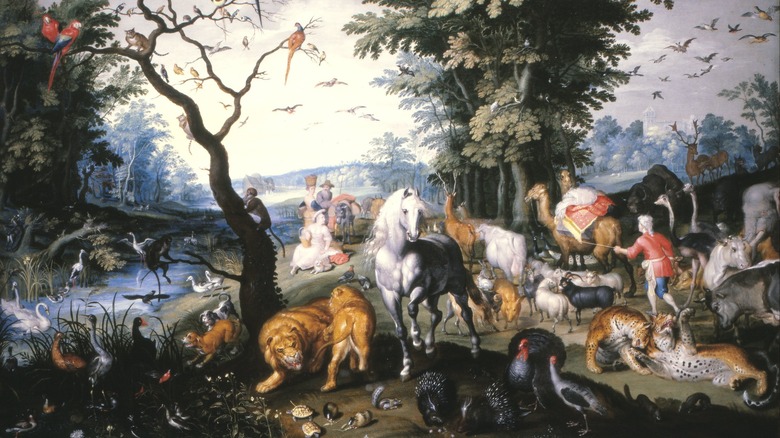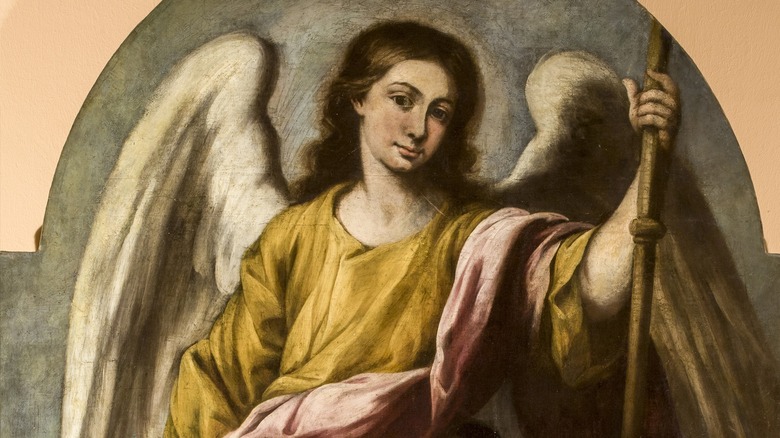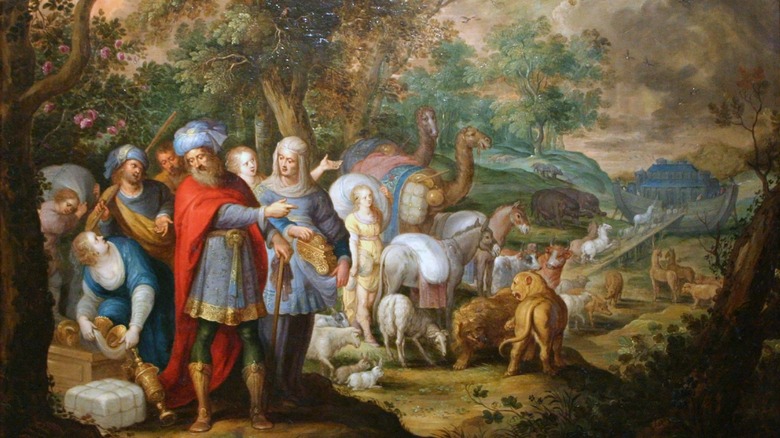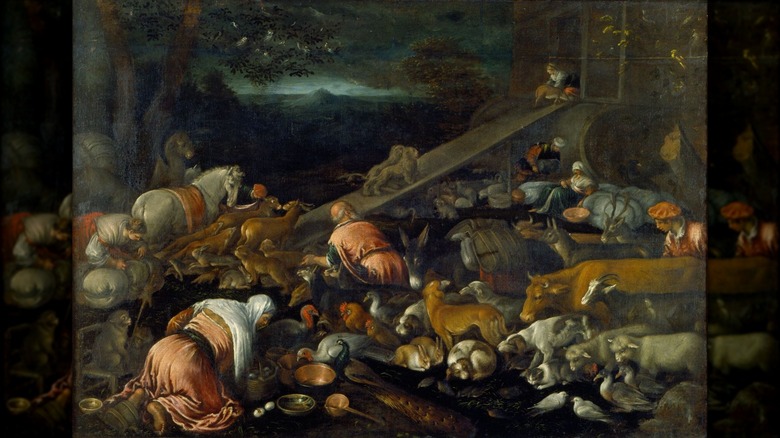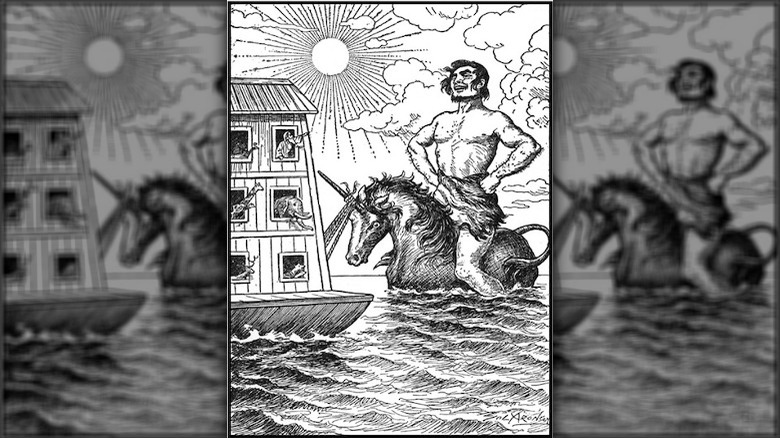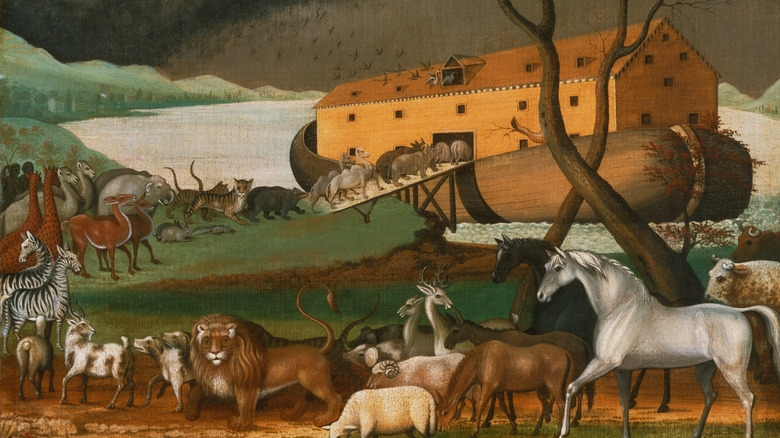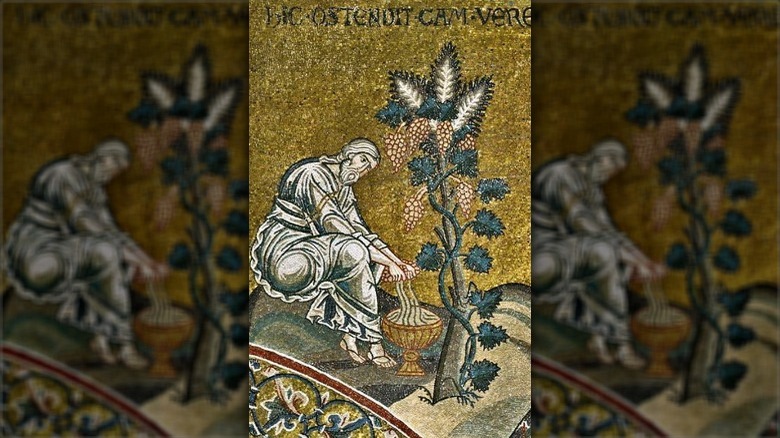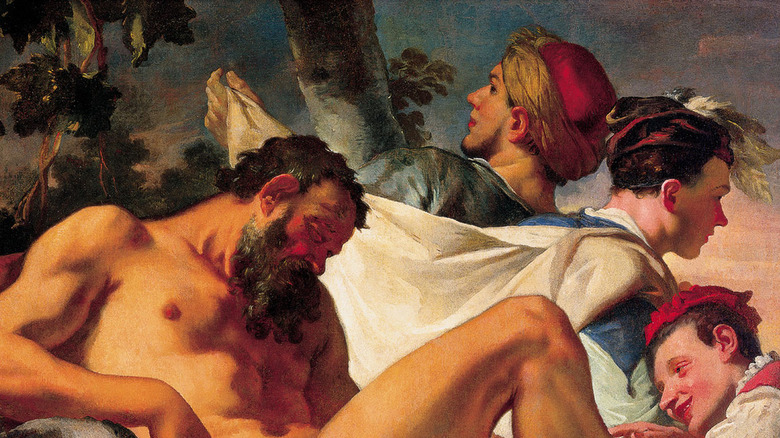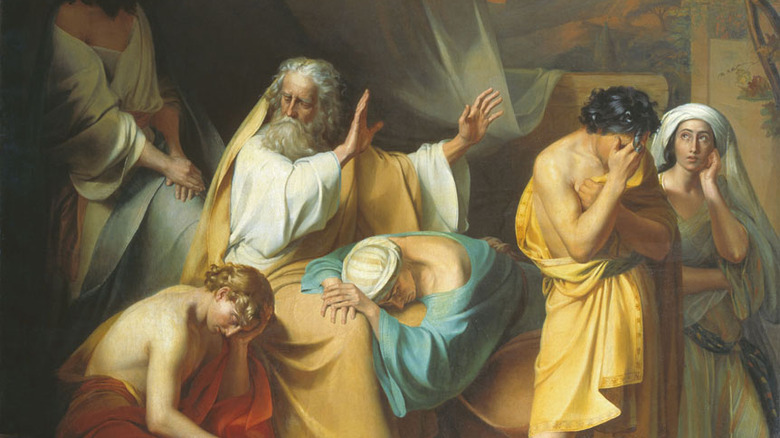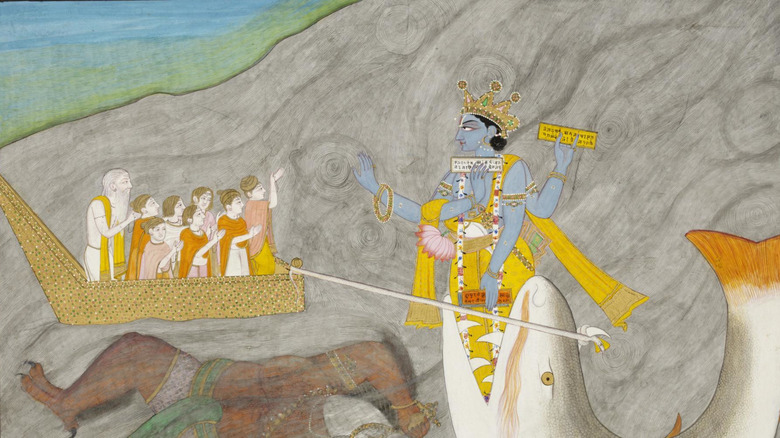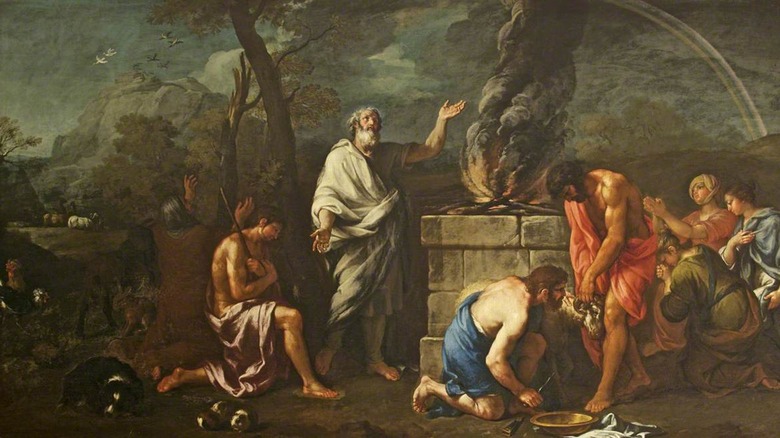The Untold Truth Of Noah From The Bible
One of the most famous stories in all of the Bible is that of Noah's Ark, a magnificent boat that held two of every animal and one human family to escape a worldwide flood sent by God to wipe out the evil of humanity. It's a very commonly told story in Sunday school classes and a surprisingly popular visual motif for children's toys and decorations considering that it's a story about a global genocide.
However, despite most people's familiarity with the story, it's likely that very few know the strange details of Noah's birth and education, or that he wasn't just the Flood Guy. Or that he wasn't the only Flood Guy. Or maybe he wasn't the Flood Guy at all. Or that America fought a Civil War because Noah invented wine. If you saw the 2014 Darren Aronofsky film "Noah" and thought, "Wow, that was weird," read on and you'll find out that maybe it actually wasn't weird enough.
Noah looked like an angel at birth
The Book of Genesis doesn't tell us anything about Noah's early life, just that he was born when his father Lamech was 182 years old when Noah was born, and that Noah himself was 500 years old when his own sons Shem, Ham, and Japheth were born. The next time Noah appears it's when God is telling him that a flood is coming. So there's hundreds of years' worth of his life not explained in the canonical Bible. Surely someone described as "blameless in his generation" did some interesting things, right? Well, fortunately, there is plenty of material from outside the biblical canon that seeks to answer these questions.
The infamous Book of Enoch is made up of a number of different documents edited together, and one of those sections contains fragments from a lost Book of Noah. This fragment tells of the birth of Noah, and how he is born with pure white skin and hair and has eyes that emit blinding light like the rays of the sun that fills the entire house. Immediately after birth, he stands up and begins speaking to God. Lamech is terrified because his baby looks more angel than human, and he has to be reassured by his grandfather Enoch that he's just a special boy. Additionally, as is true of many other heroes of the Bible, Jewish tradition says Noah was born circumcised.
No one knows what Noah means
Genesis chapter 5 says that Lamech named his son Noah because "Out of the ground that the Lord has cursed this one shall bring us relief from our work and from the toil of our hands." The text implies that the name Noah derives from the Hebrew word meaning "to rest," or else a related word meaning relief and comfort. Why, you might wonder, is his name "Rest" and not, like, "Boat Guy"? Several different possible explanations exist.
Various rabbinical sources say that Noah's invention of wine was a relief from work, or that his creation of farm implements allowed the ground to bear good things and not just thorns, or that his survival of the flood restored humanity's rule over the earth, which had been lost through Adam's sin. One text even says that before Noah's time, graves used to fill with water and cause the corpses to float to the surface, but after the flood, bodies were able to remain at rest.
Some scholars, however, claim that the relation of "Noah" to "rest" is a folk etymology and that the authors of Genesis were probably not aware of the actual origin of the name. It is possible that the name Noah is a shortening of the name Na-ah-ma-su-le-el, which is the name of a character from a fragmentary Babylonian version of the flood narrative that predates Genesis.
Noah was taught by angels
One of the Dead Sea Scrolls, known as the Genesis Apocryphon, features a conversation between Lamech and his son Noah. As in the Noah fragment from the Book of Enoch, this dialogue shows that Lamech was afraid that his newly-born son was not his own, but that of an angel. If you understand the context that in Lamech's time, lots of human women were having angel babies that grew up to be giants and monsters, you know that this isn't a ridiculous concern. As in Enoch, Lamech is eventually assured that the baby is his.
But even though Noah isn't genetically related to angels, that's not to say he has no connection with them whatsoever. Various texts about Noah, including the Book of Jubilees, which is canon in the Ethiopian Orthodox Church, tell how Noah was instructed by the archangel Raphael in how to use plants to make medicines and cure disease. Noah writes all of these cures down and passes them down from generation to generation. These diseases were understood to be caused by demons, the ghosts of those evil angel babies, so Raphael is sent to bind those demons and help Noah and his descendants survive illness (he leaves some demons loose so that they can punish criminals, however).
In another angel connection, the Book of Enoch says that it is the archangel Uriel who is sent to warn Noah of the impending flood.
Noah's wife has many (possible) names
Despite the fact that the sacred text "Bill and Ted's Excellent Adventure" tells us that Noah's wife was named Joan of Arc, the Bible never says what her name is, in Genesis or elsewhere. Readers familiar with the Bible know that it's not uncommon for women in the Bible — even those who play big roles — not to get names. But as with so many other small details, this is the kind of thing that tradition and non-canonical texts like to fill in. As a result, there are a number of different names that get applied to the woman who is allegedly the common ancestor of all humanity.
The Book of Jubilees is the earliest extant source for the identity of Noah's wife. It says that she is Emzara, the daughter of Lamech's brother Rake'el, making her Noah's first cousin. This name is also contained in the Genesis Apocryphon. Perhaps the most widespread name for her is Naamah, which is the one used in the 2014 film. One source says Naamah was the sister of Tubal-Cain (a wicked descendant of the murderer Cain, the world's first blacksmith, and the villain of the movie), while another says she was a daughter of Enoch, possibly because these scholars didn't like the idea of Noah's wife being descended from Cain. In texts of the gnostic sect known as the Mandaeans, she is named Nuraita.
Life on the ark was miraculous
Obviously, the most famous story of Noah and his family is that of the ark on which they provided sanctuary for a mated pair of every animal on earth in order to repopulate after God flooded the world, and if you've heard that story, you've probably wondered about the logistics of such an affair. How did all the animals fit? How did they all eat? Unfortunately, the Bible doesn't supply any answers to these questions. Fortunately, as you may have guessed, the ancient rabbis have stepped in to fill in those blanks.
Various texts tell of how the people fated to die in the flood try to storm the ark and force their way on to save themselves, but the lions and other wild animals tear them to shreds before they can reach the door. Once on board, Noah doesn't sleep for even one moment for an entire year, as he and his sons have to spend all their time feeding the animals. The rabbi Nachmanides states that the construction of the ark was miraculous in nature, TARDIS-like in its ability to be bigger on the inside so that it could contain all the animal species and the food needed to feed them for a year. Further tradition says the lions once got upset at Noah for being late with their food and bit him, causing him to walk with a limp for the rest of his life.
A giant survived the Flood
If you've read through the narrative parts of the Hebrew Bible, you may have encountered something of a continuity problem: Genesis 6 says that God chose to flood the earth and kill all of humanity because human beings had become too wicked, especially those who were born from the "sons of God" and "daughters of humans," the Nephilim. According to a lot of ancient literature — including most notably the Book of Enoch — the Nephilim were giants born of the interbreeding of angels and humans. Enoch says the Flood is designed specifically to wipe out the giants, yet books of the Bible set after the Flood, such as Numbers and Samuel, talk about giants in the land of Canaan descended from those antediluvian titans.
So did the giants die in the Flood or survive it? To patch this continuity gap, Jewish legend says that the race of giants survives through Og, the giant king of Bashan who appears in the canonical books of Numbers and Deuteronomy. One version says Og sat on the roof of the ark and Noah fed him every day through a window with a long stick. Another version says he snuck onto the back of the re'em, an enormous unicorn that was also too big to fit in the ark and so was tied to the back of it. Og survives the Flood and goes on to make trouble for both Abraham and Moses.
The Gnostic Noah didn't have an ark
A completely different version of the story of Noah and the Flood can be found in the Apocryphon of John, one of the most significant works of gnostic Christian mythology. While there was no one single group who called themselves "Gnostics" in antiquity, Gnosticism represents a set of ideas held commonly by groups such as the Valentinians and the Sethians, the latter of whom used the Apocryphon of John. Key to their beliefs was that the material world was not created by a benevolent God, but rather a corrupt lesser being called Yaldabaoth. Sethian philosophy, then, was all about trying to extract the pure light of spirit from the corrupt darkness of the physical world. The Apocryphon of John was an account of the creation of that fallen world and how we might escape it.
In this version of events, the Flood occurs when Yaldabaoth regrets creating a corrupt world and intends to destroy it. Fortunately for Noah, the benevolent personification of foreknowledge warns him of his impending doom. Rather than an ark, however, Noah hides himself inside of a glowing cloud where he rides out the storm. Another significant departure from canon is that in this version, Noah persuades a large number of righteous people to come with him and be saved, rather than just his sons and their wives.
Noah was an agricultural innovator
While these days Noah is undoubtedly most famous for being the guy on the ark, the Book of Genesis relates that he was also the first person to plant grapes and make wine. This idea of Noah as an agricultural innovator is expanded on in later tradition, in which Noah is said to have been the inventor of the plow, the sickle, the ax, and other implements essential for planting, growing, and harvesting. In conjunction with his invention of wine, this makes Noah a considerable cultural hero and benefactor of humankind.
It's in this context that many rabbis understood the idea that Noah would be a comfort to the people and the land. While some people today might see alcohol as a net evil for society, the ancients would have seen wine and the cultivation of grapes as fundamental to civilization. The curse of Adam said that humans would have to work the ground. God tells Adam in Genesis 3, "Cursed is the ground because of you; in toil you shall eat of it all the days of your life; thorns and thistles it shall bring forth for you; and you shall eat the plants of the field." Prior to the invention of tools, this work had to be done by hand, which led to the landscape being covered in rough and tangled plants. In this way, Noah's work relieved both humans and the land from Adam's curse.
Noah was probably not originally the Flood Guy
Besides the fact that the traditions of Noah the Ark Guy and Noah the Grapes Guy feel almost completely disconnected, perhaps even more surprising is the fact that the more famous of those two stories is possibly the latter. When Noah is first introduced in Genesis chapter 5, the explanation of his name ties him directly to his role as an agricultural figure, bringing comfort to the people in the land through innovations in viticulture. The dissimilarity between the blameless man that God preserves in Genesis 6 and the drunk and naked guy from Genesis 9 (more on that in a second) has led some scholars to believe that the story of the Flood was retroactively pasted onto this guy who was originally famous for inventing wine.
Some scholars have suggested that the original Flood hero was not Noah, but his great-grandfather Enoch. It is possible that a scribe made a mistake in copying the name Enoch and wrote Noah, as the two names are closer in Hebrew than they are in English. Elements from the Book of Enoch support this idea as well: Enoch is given a vision of the Flood when he is 500, which is how old Noah is when his sons are born. The Flood lasts 365 days, a number symbolically linked to Enoch. Additionally, the hero from the Babylonian Flood myth is taken directly up to Heaven, just like Enoch is.
Noah's confusing curse
So if Noah wasn't originally the Flood Guy, that means that the oldest traditions surrounding him are from the story they definitely didn't include in the "Veggie Tales" version. In Genesis chapter 9, after Noah invents wine, he gets drunk and passes out naked on the floor of his tent. His son Ham comes in, "[sees] the nakedness of his father and [tells] his two brothers outside." Shem and Japheth cover Noah up without looking at their naked father. When Noah wakes up, he curses not Ham, but rather Ham's son Canaan, so that his descendants will be slaves to the other two. This verse, by the way, was used to justify slavery in the U.S., with Africans being interpreted as the descendants of Ham.
The point of the story at heart is to explain the long-standing enmity between the Israelites (from the line of Shem) and the Canaanites, whom the Bible depicts as sexual deviants, but the story itself is confusing. What did Ham do wrong? And why was his son cursed and not him? Various interpretations have tried to clarify the story by saying Ham did something sexual to his father — or even his mother, with Canaan being the offspring of that illicit union. The most likely explanation, however, is that the version in Genesis splices together two different versions of the story: one with a brother named Ham, and one with a brother named Canaan.
Not the only Flood Guy
While the story of Noah building an ark to survive a flood sent to destroy humankind is certainly these days the best-known version of that story, Noah wasn't by any means the only Flood Guy, nor was he even the first. In fact, the story of a lone group of human survivors escaping a worldwide flood in a boat is so common across Europe, Asia, and the Americas, that the so-called "flood myth" or "deluge myth" is one of the best-known tropes in comparative mythology.
Besides Noah, Flood heroes can be found in the Mesopotamian stories of Ziusudra, a virtuous man who rode out the storm in a boat built at the command of the god Enki, and the more famous narrative of Utnapishtim and his wife from the Epic of Gilgamesh. Greek myth tells of Deucalion and Pyrrha, who repopulate the world after Zeus floods it for the wickedness of humanity. Hindu myth has Manu, who is warned to build a boat by a fish he had helped.
The ubiquity of this story across Eurasia suggests it may have roots in an actual historical event — not a true worldwide flood, but probably a massive deluge in southeast Mesopotamia in the plains between the Tigris and Euphrates. The geological record shows that such a flood did happen around 2900 BCE and may have inspired all of these stories.
Was he a good man?
Even though Genesis 6:9 says, "Noah was a righteous man, blameless in his generation; Noah walked with God," the debate over whether or not Noah was truly a good person has been surprisingly common over the centuries. Thanks in part to details like Noah's drunkenness, many rabbis argued that Noah was only good in a relative sense: he was good for his generation, but since the rest of the world was filled with cannibalistic giants, this was a low bar to clear. Some went so far as to claim he would have been wiped out in the flood too, except that God showed mercy for the sake of his more righteous descendants like Abraham and Moses.
Other rabbis and commentators argue that no, Noah was righteous in every sense and took no part in the evil of his generation. In fact, they say, he intentionally took 120 years to build the ark in order to give the people of his generation more time to see the light. The urge to depict Noah as a purely blameless man is probably behind the depictions of him being born as a snow-white baby and so on. Early Christian writers also portray Noah as an upright man, with the Epistle to the Hebrews calling him "an heir to the righteousness that is in accordance with faith," and the Second Epistle of Peter calling him "a herald of righteousness."
